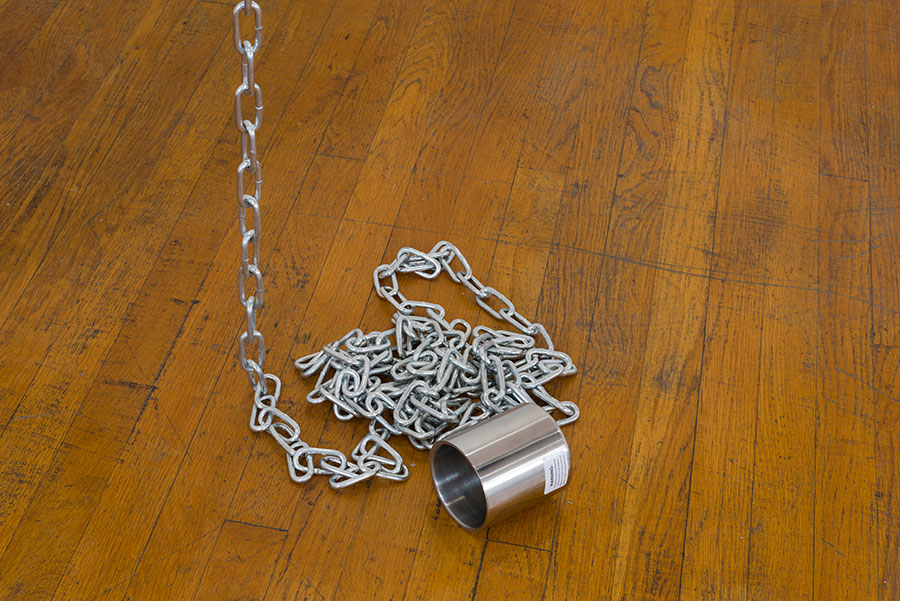Patrick Staff Proposes Drunkenness as a Queer Mode of Being
The LA-based artist’s videos, sculptures and photographs frame public drinking as an issue of gender, race and class
The LA-based artist’s videos, sculptures and photographs frame public drinking as an issue of gender, race and class

Los Angeles-based artist Patrick Staff toys with different forms of contamination and intoxication, internal and external, in their first solo exhibition at Commonwealth and Council. As a complement to Bathing (2018), Staff’s video concurrently on view in the Made in LA biennial at the Hammer Museum, the works shown here frame public drinking as an issue of gender, race and class. Exploring connections between inebriation and health, criminalization and morality, access and legitimacy, Staff proposes drunkenness as a queer mode of being.

In Bathing, a choreographed performer careens across the water-logged surface of a metal basin in an industrial space. The performer appears here in a photograph (Kaya Facedown, all works 2018) laying flat within the basin, wet and fully dressed in water-swollen clothing. The basin, now mostly dry, has been placed in the middle of the gallery. A jumper and sock laid inside it suggest the absent body, while the sock’s pair soaks up running water in a nearby drinking fountain, a series of which have been installed in the gallery. Akin to those found in public parks, hospitals and schools, the fountains are functionally altered and, in some cases, pimped with temporary tattoos. Their titles – such as Dribbler and Public Drunk (all works 2018) – qualify them as anthropomorphic stand-ins for crapulent bodies.
Variously shaped and sized, installed on the walls and on the floor, the fountains source their water from individual buckets. Pumps and tubes funnel the water up, through the tap, into the drain, and back down again. Self-sufficient and continuously running, the sculptures convey a sense of thirst sated, albeit by a limited supply. This jars with a feeling that the water, recycled through metal, vinyl and plastic, can’t be good to drink. Adding to this effect in Foreign Cousins are wet and dirty face masks lying atop the sculpture’s two wall-mounted fountains. Used and discarded, the masks are covered in smudged-off make-up, as if from a night’s carousing.

Staff’s stainless steel Common Cup hangs from the gallery’s ceiling by a long metal chain, resembling the cups that were once bound to public drinking fountains. From the exhibition text, we learn that, in the US and UK, these fountains were first constructed in the mid-19th century as a response to a variety of public health crises, such as the cholera epidemic, as well as moral concerns; access to free and clean water was schemed as an incentive for sobriety. The work’s title refers to the ‘common people’ for whom free, public fountains served as a vital resource. The utilities also became a racist symbol for contamination: in the US South, between the end of the Civil War and the passage of the 1964 Civil Rights Act, public fountains were segregated by race under ‘Jim Crow’ laws. A similar lack of access has also historically affected the queer community, from AIDS-related paranoia to the harassment still faced by many transgender people when they attempt to use the toilet. The fear of contamination in these spaces is a fear of difference, and rather than preserving public health often leads to restrictions against certain bodies or bodily functions.
Throughout this exhibition, Staff presents objects as they swell, dilute, break, corrode and expand under the influence of liquids. It is by such processes of transformation and release that intoxication becomes a transgressive state: blurring balance and vision, a sense of place and time, drunkenness makes the body wayward and even more difficult to master.
Main image: Patrick Staff, Foreign Cousins (detail), 2018, mixed media. Courtesy: the artist and Commonwealth & Council; photograph: Ruben Diaz























